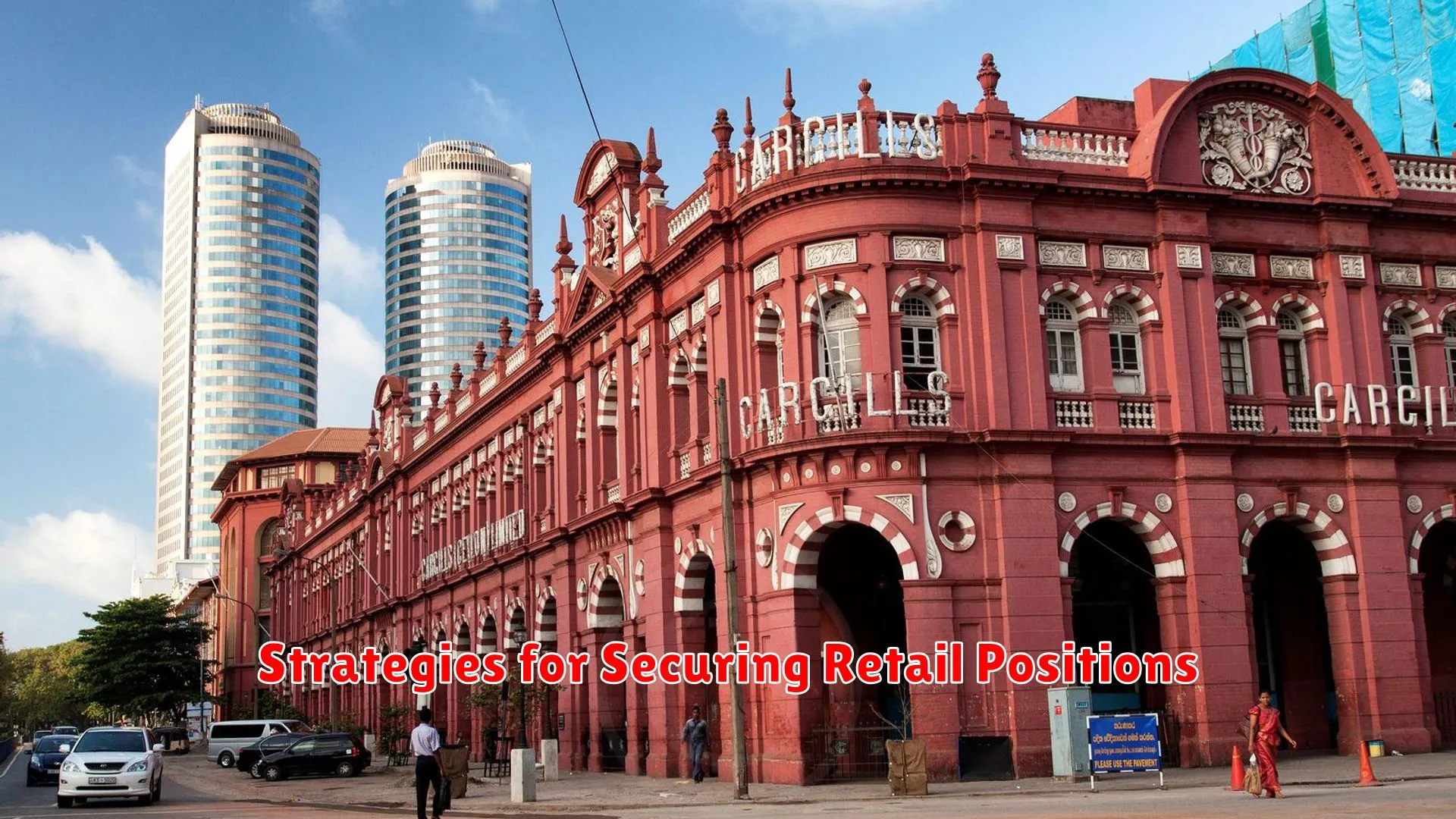
Discover the dynamic opportunities and challenges of pursuing a career in Sri Lanka’s thriving retail industry, where innovation and customer-centric strategies play a pivotal role in shaping the market landscape.
Retail Sector Insights
Within Sri Lanka’s vibrant retail industry lies a wealth of opportunities for individuals looking to establish a successful career. Understanding the retail sector insights can provide invaluable guidance for those wanting to navigate this dynamic field.
Consumer Behavior Trends: Retail professionals in Sri Lanka need to stay attuned to evolving consumer behavior trends. With the rise of e-commerce and changing shopping preferences, adapting strategies to meet customer needs is crucial.
Market Competition: The retail landscape in Sri Lanka is increasingly competitive. Individuals aspiring to excel in this industry must demonstrate a willingness to innovate, differentiate their brands, and explore niche markets.
Technology Integration: Embracing technology is a key aspect of success in the retail sector. From implementing efficient inventory management systems to leveraging data analytics for personalized marketing, staying tech-savvy is essential.
Employee Development: Companies in Sri Lanka’s retail industry value employees who display a strong work ethic, adaptability, and excellent customer service skills. Investing in continuous learning and skill development can enhance career growth opportunities within this sector.
By staying informed about the latest retail sector insights and trends, individuals can position themselves for a fulfilling and prosperous career in Sri Lanka’s dynamic retail landscape.
Promising Retail Jobs

Building a career in Sri Lanka’s retail industry offers a range of promising job opportunities for aspiring professionals. With the sector experiencing rapid growth and evolution, there are several roles that hold great potential for career advancement and personal development.
Sales Associate
One of the most common entry-level positions in retail, a sales associate plays a crucial role in interacting with customers, assisting with purchases, and ensuring a positive shopping experience. This role provides a strong foundation in customer service, sales techniques, and product knowledge, paving the way for future growth within the industry.
Retail Manager
A retail manager oversees the daily operations of a store or department, managing staff, inventory, and customer satisfaction. This role requires strong leadership skills, business acumen, and the ability to drive sales and profitability. Retail managers have the opportunity to advance into higher-level management positions within the industry.
Visual Merchandiser
Visual merchandisers are responsible for creating visually appealing displays and layouts to attract customers and drive sales. This role combines creativity with a strategic mindset, as visual merchandisers play a key role in enhancing the overall shopping experience and brand image of a retail establishment.
E-commerce Specialist
As online shopping continues to grow in popularity, e-commerce specialists are in high demand in the retail industry. These professionals manage online sales platforms, digital marketing strategies, and customer engagement to drive online revenue. E-commerce specialists have the opportunity to stay at the forefront of retail technology and innovation.
Skills Required for Retail Careers
In order to excel in Sri Lanka’s retail industry, individuals need to possess a diverse set of skills that are essential for success in this competitive field. Here are some key skills required for retail careers:
- Customer Service: One of the most important skills for a retail career is the ability to provide excellent customer service. Retail professionals should be able to interact with customers in a friendly and helpful manner, addressing their needs and ensuring a positive shopping experience.
- Communication Skills: Effective communication is crucial in retail, as professionals need to interact with customers, colleagues, and suppliers on a daily basis. Clear communication can help prevent misunderstandings and build strong relationships.
- Sales Skills: Retail professionals should be adept at selling products and services, understanding customer needs, and persuading customers to make purchases. Strong sales skills can drive revenue and contribute to the success of a retail business.
- Product Knowledge: Understanding the products being sold is essential for retail professionals to assist customers effectively. Having in-depth knowledge about the products can help employees make informed recommendations and address customer queries confidently.
- Problem-Solving Abilities: In the fast-paced retail environment, employees may encounter various challenges that require quick and effective solutions. Retail professionals need to be equipped with problem-solving skills to handle customer complaints, inventory issues, and other unforeseen circumstances.
Strategies for Securing Retail Positions

Securing a retail position in Sri Lanka’s thriving retail industry requires a combination of skills, experience, and strategic approaches. Here are some effective strategies to help you in building a successful career:
- Develop Relevant Skills: Enhance your skill set by acquiring knowledge in areas such as customer service, sales, inventory management, and merchandising. Employers in the retail sector value candidates with a diverse range of skills.
- Gain Practical Experience: Internships and part-time roles in retail environments can provide valuable hands-on experience and improve your understanding of the industry’s day-to-day operations.
- Network: Establish connections within the retail industry through networking events, career fairs, and online platforms. Building relationships with professionals in the field can open up opportunities for job referrals and mentorship.
- Showcase Your Passion: Demonstrate your enthusiasm for the retail industry during job interviews by discussing relevant experiences and projects that highlight your dedication and knowledge of the sector.
- Stay Updated: Keep yourself informed about the latest trends, technologies, and best practices in the retail industry. Continuous learning and adaptability are crucial for success in this dynamic field.
Tips for Retail Job Interviews
When aiming to secure a promising career in Sri Lanka’s thriving retail industry, acing job interviews is crucial. Here are some valuable tips to help you impress potential employers:
- Research the Company: Before the interview, take the time to understand the company’s values, products, and target market. This knowledge will show your interest and preparation.
- Dress Appropriately: Dress professionally and choose attire that aligns with the company’s dress code. First impressions matter, so dress neatly and ensure your grooming is on point.
- Show Enthusiasm: Express genuine enthusiasm for the role and the company during the interview. Employers value candidates who display passion and a positive attitude.
- Highlight Customer Service Skills: Retail positions often require strong customer service skills. Share examples of how you have successfully dealt with customers in the past to showcase your abilities in this area.
- Prepare for Common Questions: Anticipate common interview questions related to retail roles, such as your experience handling difficult customers or your approach to meeting sales targets. Practice your responses to ensure you’re ready.
- Ask Thoughtful Questions: Show your interest in the role by asking insightful questions about the company, the team you’ll be working with, or opportunities for career growth within the organization.
- Follow-Up with a Thank-You Note: After the interview, send a thank-you email to express your gratitude for the opportunity. This simple gesture can leave a positive impression on the hiring manager.
Understanding Retail Workplace Dynamics

In the dynamic retail industry of Sri Lanka, having a solid understanding of retail workplace dynamics is essential for anyone looking to build a successful career. Retail workplace dynamics refer to the interactions, structures, and processes that shape the working environment within retail establishments.
1. Team Collaboration: Retail workplaces thrive on effective collaboration among team members. From sales associates to managers, fostering a culture of teamwork and communication is vital for achieving common goals and providing excellent customer service.
2. Customer-Centric Approach: Retail workplace dynamics revolve around a customer-centric mindset. Understanding the needs and preferences of customers is crucial in shaping sales strategies, product offerings, and overall customer experience.
3. Adaptability and Flexibility: Retail environments are constantly evolving, requiring employees to be adaptable and flexible. Being able to quickly adjust to changing trends, customer demands, and operational requirements is key to success in the retail industry.
4. Performance and Accountability: A key aspect of retail workplace dynamics is the focus on performance and accountability. Setting clear expectations, tracking key performance indicators, and holding employees accountable for their work contribute to a culture of productivity and success.
5. Learning and Development: Continuous learning and development are integral to thriving in the retail industry. Retail employees should be encouraged to upskill, learn about new products, technologies, and industry trends to stay competitive and drive career growth.
By understanding and embracing the retail workplace dynamics outlined above, individuals can navigate the competitive landscape of Sri Lanka’s retail industry and build a rewarding career filled with growth opportunities and personal development.
Conclusion
In conclusion, pursuing a career in Sri Lanka’s retail industry offers promising opportunities for growth and development.















